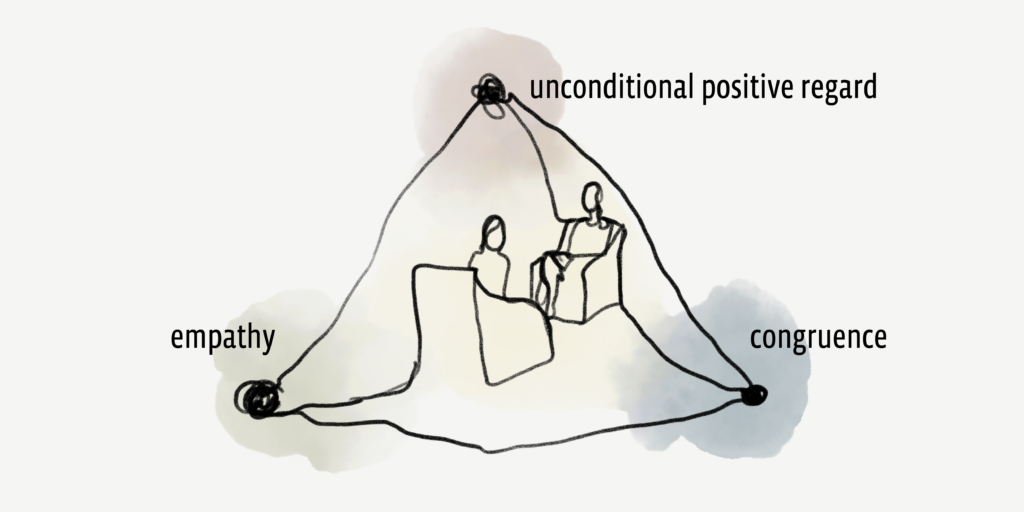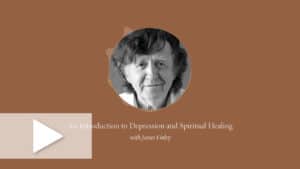
For James Finley, therapeutic work can help us trust in the divine depth dimension of our lives. He presents a model offered by psychologist Carl Rogers (1902–1987):
Carl Rogers created something called the “Rogerian triad.” [1] He taught there are three points of a triangle representing the beating heart of the therapeutic relationship. The first point on the triangle is unconditional positive regard. It goes like this: the therapist sits with the patient in therapy. The therapist lets the person know that no matter what you share with me about yourself, it will not diminish my deep respect for who you are as a human being. Little by little, the therapist’s deep respect and unconditional positive regard for you can transfer over to you. It can start becoming your renewed sense of unconditional positive regard for yourself. You internalize it.
The second point is empathy. The therapist says, “I hear you saying …” and they say it back in such a way that you know they heard you. When you know you’ve been heard, you also know that you’ve been understood. The experience of being understood can deepen your capacity to hear yourself and understand yourself and to have empathy with yourself.

The third point of the triangle is congruence, which is that the therapist is always honest with you in a respectful way. The therapist might say, “You know, quite honestly, I’m concerned about you when you talk like this. I’m really concerned about where you are.” And in that kind of compassionate honesty, little by little, you learn to be honest with yourself. When we risk sharing what hurts the most in the presence of someone who will not invade us or abandon us, we can learn not to invade or abandon ourselves. In the alliance with the clinician, you can be re-parented in love.
What I’m suggesting is this: If we take the three points of the triad, lay it flat on the ground, and draw three lines down, we find each point connecting to God.
The clinician’s unconditional positive regard for you incarnates the abyss-like infinite positive regard of God for you as the beloved. The presence of the clinician then becomes an incarnate manifestation of the welling up of this depth dimension, letting you know that you’re invincibly precious in all your wayward ways. To summarize Thomas Merton, there is something within you that is not subject to the brutalities of your own will, for it is that in you that belongs entirely to God. [2]
The truth is that God is infinitely in love with you and infinitely aware of who you are. With infinite wisdom, God lovingly understands you through and through forever. Congruence is truthfulness, compassionately stated. You can be truthful with yourself. What is the truthfulness with yourself? It’s that you’re an infinitely precious, broken person. This infinite love for you permeates your brokenness through and through. It’s with you unexplainably forever.
Reference:
[1] See Carl R. Rogers, On Becoming a Person: A Therapist’s View of Psychotherapy (Boston, MA: Houghton Mifflin, 1961), chapter 14.
[2] See Thomas Merton, Conjectures of a Guilty Bystander (Garden City, NY: Doubleday and Company, 1966), 142.
Adapted from James Finley, “An Introduction to Depression and Spiritual Healing,” 2023 Daily Meditations: The Prophetic Path, Center for Action and Contemplation, April 4, 2023, video, 24:44.
Image credit: A path from one week to the next—CAC Staff Exercise in Grief and Lamentation credits from left to right: Jennifer Tompos, Jenna Keiper, Jenna Keiper. Used with permission. Click here to enlarge image.
On retreat, the CAC staff used watercolors to connect to our collective grief. This is one of the watercolor paintings that came from that exercise.
Story from Our Community:
I’ve struggled my whole life with depression, anxiety, complex trauma and many years of addiction. My therapist introduced me to Richard Rohr and his teachings have been monumental in my healing. Although recovery has been long and hard work—and always will be—I am now better able to find peace and love with God and slowly with myself. A very heartfelt thank you to Fr. Richard, the CAC, and the whole community. You truly inspire me to find meaning from my suffering and help others with a loving heart. —Erika C.





